*FYI - this post may contain affiliate links, which means we earn a commission at no extra cost to you if you purchase from them. Also, as an Amazon Associate I earn from qualifying purchases. Check out our Privacy Policy and Disclosure. for more info.
There are many countries I love in Europe, but if I were to pick one that has me (and my bucket list) in an absolute chokehold, it’d be Switzerland.
I mean… There’s glossy lakes in every shade, epic mountains caked with snow, and town after town with views so perfect, they’ll actually make you mad.
… which explains why I keep crawling back, like a sad obsessive ex.
Over the years, I’ve been lucky enough to visit Switzerland in all seasons and for all reasons – whether solo, with friends, with family, or as a romantic getaway. In that time, I’ve not only been able to amass a restraining order-level of enthusiasm, but I’ve also collected quite the list of random Switzerland travel tips learned through trial and error.
… so allow me to share those with you today!
Read on for a list of must-knows before you visit Switzerland for yourself. With these on your side, you’ll soon see why this is one of my favourite countries in the world.
1. Budget plenty of money for your Switzerland trip
As you might expect from a country that seems this perfect, Switzerland has one fatal flaw: and that is its prices.
Indeed – beautiful Switzerland is a country filled with sights that will drop many a jaw, but perhaps none more so than the sight of your first restaurant receipt.
Dining out is expensive in Switzerland, a place known for having the priciest Big Mac in the world. But so is practically everything else – from transport and hotels to groceries. In fact, it’s fairly common for Swiss residents near the border to road trip across to France, Germany or Italy to save a few francs on household goods.
All this to say: make sure you’re ready for Switzerland’s high price points, and plan accordingly.
Of course, there are ways to cut costs and save money while travelling Switzerland, but we’ll cover those more in-depth below.
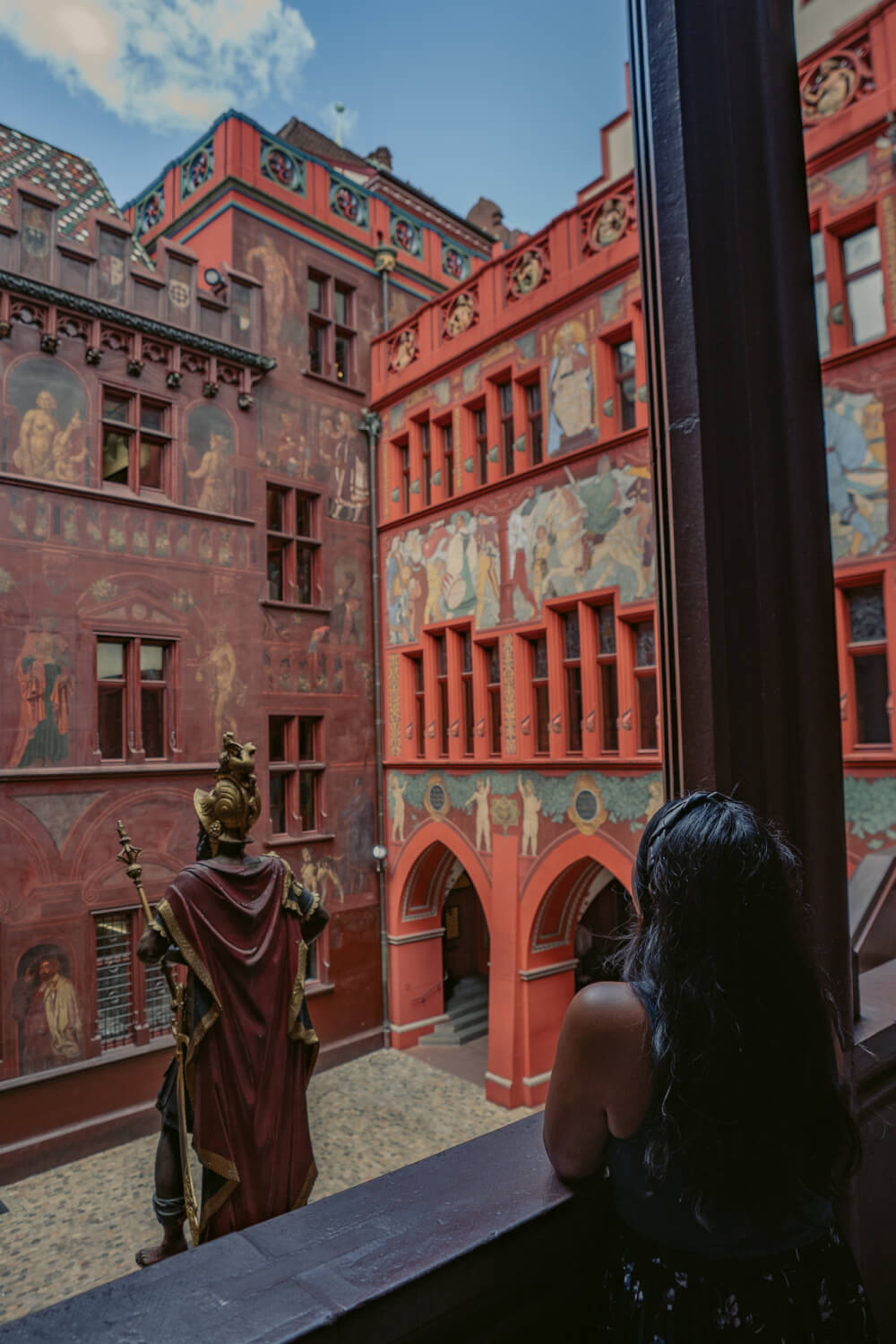
2. Remember Switzerland is NOT in the EU
While Switzerland is part of the Schengen Zone (which means yay, borderless travel!), it is not actually part of the European Union.
Practically speaking, this isn’t a big deal for tourists, BUT I need to mention it in case you’ve purchased some kind of phone plan that is for EU only.
On a trip a few years ago, I was happily using my German SIM card as we crossed the border into Switzerland and within minutes, all 20 euros of my phone credit had been zapped because I forgot my plan didn’t cover countries outside of the EU!
Now, most packages have smartened up these days and offer options for “EU + Switzerland” but be sure to double check just in case, lest you end up in debt from loading a TikTok recipe you’ll never even make.
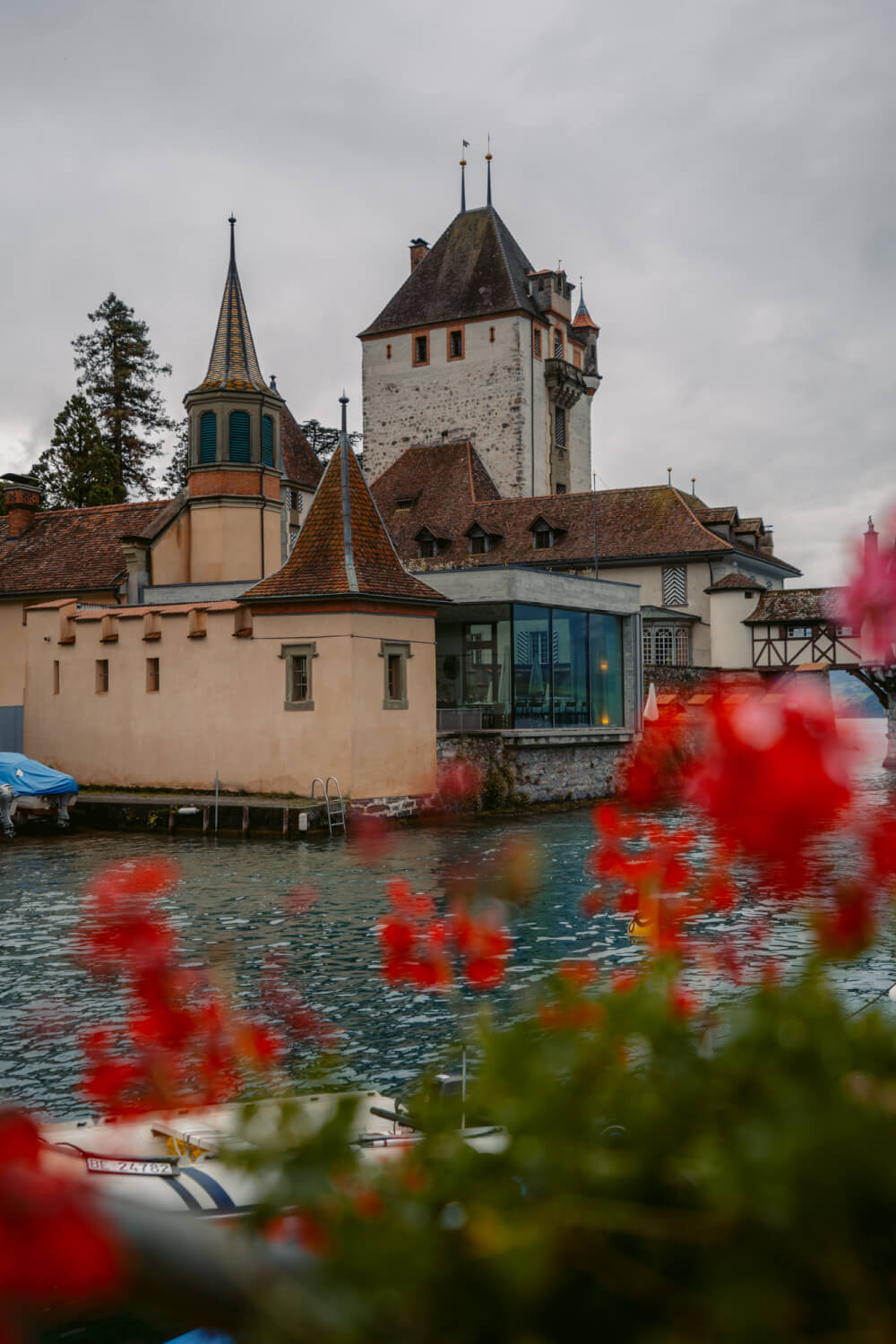
3. Switzerland has its own currency
Another practical Switzerland must-know related to the above point is that Switzerland has its own currency – the almighty Swiss Franc (or CHF).
The bad news is, this means your euros probably won’t get you far. The good news is, their money is vibrant and beautiful, like every other dang thing in the country.
Of course, if you’re wary of withdrawing too much local currency, I’ve found Switzerland to be very card-friendly, so if you have a good credit/debit card with minimal foreign transaction fees, you’ll get by fine with that in most places. I can highly recommend Wise for that purpose.
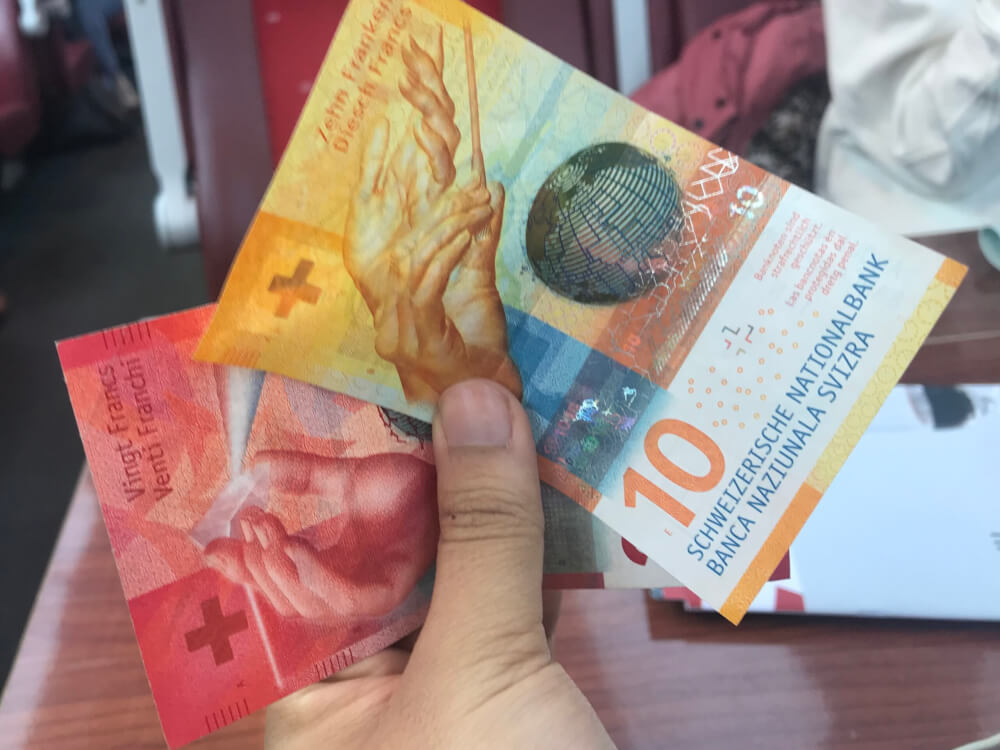
4. Switzerland also has its own unique plugs/outlets
In addition to the currency being different, the outlets are also different.
In Switzerland, they use Type J outlets that typically look like this, with scattered dots akin to a shocked emoji:

Usually Type F Euro plugs can fit these outlets, but it’s very important you make sure your adapter isn’t one of the circular ones because some of the outlets in Switzerland have these flat thin frames and the circular adapters won’t properly fit. Don’t say I didn’t warn you…
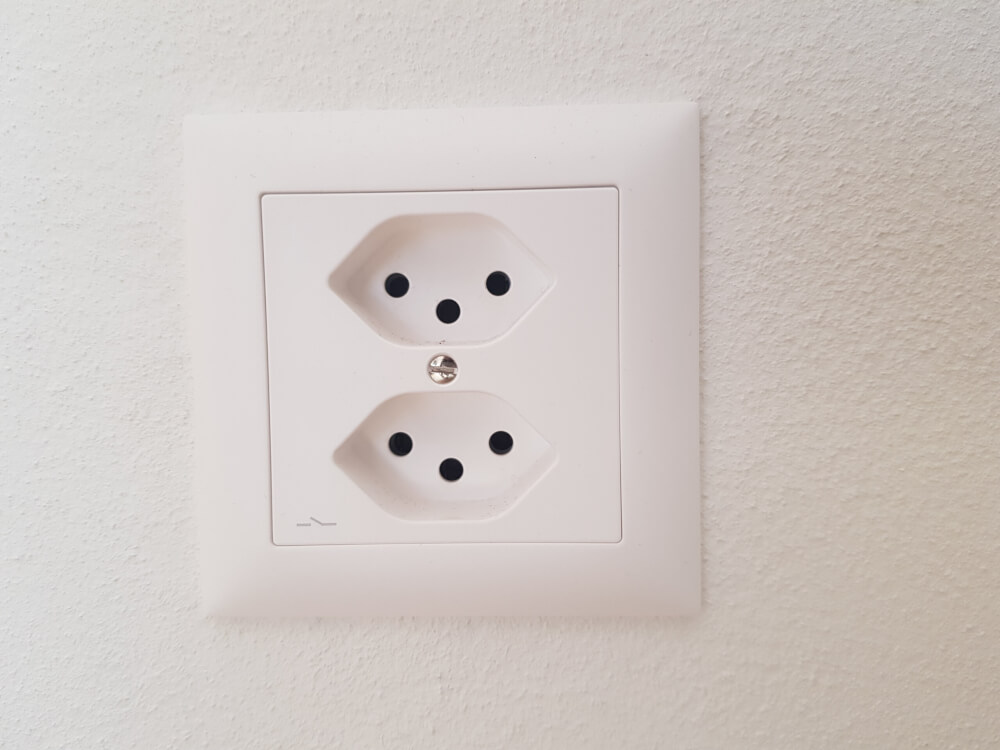
5. Know that they speak different languages in different parts of Switzerland
Another important Switzerland must-know is that when it comes to the local language, there’s no such thing as “Swiss”.
People in Switzerland are among the most multilingual you’ll meet (next to Luxembourg, anyway!) so depending on where you are in the country, you’ll hear German, French, Italian or Romansch spoken.
So, come prepared and do your research about which languages are widely spoken where you’re visiting, and try to at least learn hello and thank you in those languages as well.

6. Consider flying into one airport and out another
The major international airports in Switzerland can be found in Zurich, Geneva and Basel (which, fun fact – is one of the few airports jointly operated by two countries, France and Switzerland).
Anyways, if you plan on covering a lot of ground while in Switzerland, I would actually recommend flying into one airport and out of another, if the cost difference isn’t substantial.
The reason I say that is while Switzerland is small, there isn’t really a good way to travel around the country in a loop. So logistically, it kind of makes sense to travel in one direction, so you don’t have to double back.
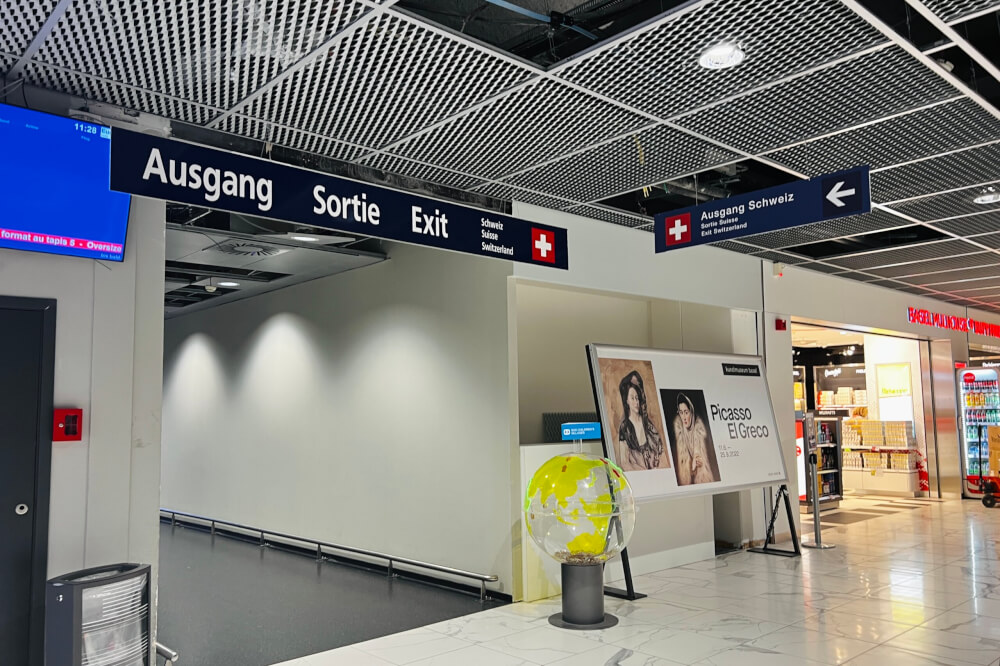
7. Or concentrate your Switzerland trip in a smaller area
Alternatively, I would advise picking a smaller region/area of Switzerland and exploring it thoroughly, rather than try to cover too much ground.
Transportation in Switzerland is expensive, so one of the best ways to cut costs is to simply not move around as much… which is Mission Impossible, I know, because of the many, many iconic spots you’ll no doubt want to see.
The trouble is though, many of these most famous spots aren’t actually that close together.
So, instead, I’d advise committing to one area – by doing that, you also start to discover more hidden gems and unique spots beyond the most famous attractions… which is of course a huge win in my books!
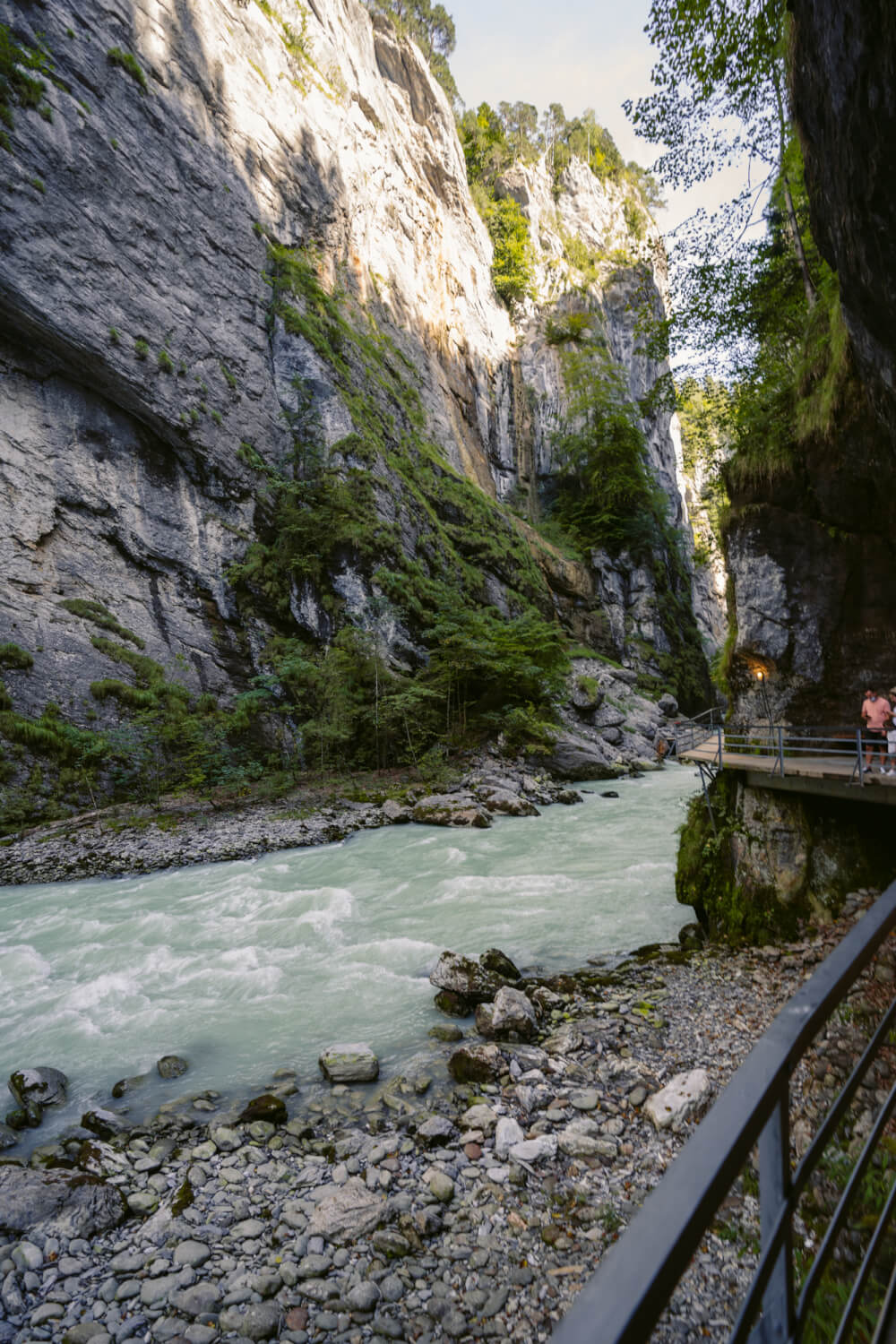
8. Go beyond the big cities in Switzerland
I have loved visiting many of the big cities in Switzerland like Lucerne, Zurich and Basel.
BUT, I would say the real charm of the country lies beyond city life, and if you really want the ultimate Switzerland experience, I highly encourage you venture off to the countryside for at least a day trip – exploring everything from quaint little villages and epic mountains to lakes more vibrant than Gatorade.
That’s where the real magic happens!
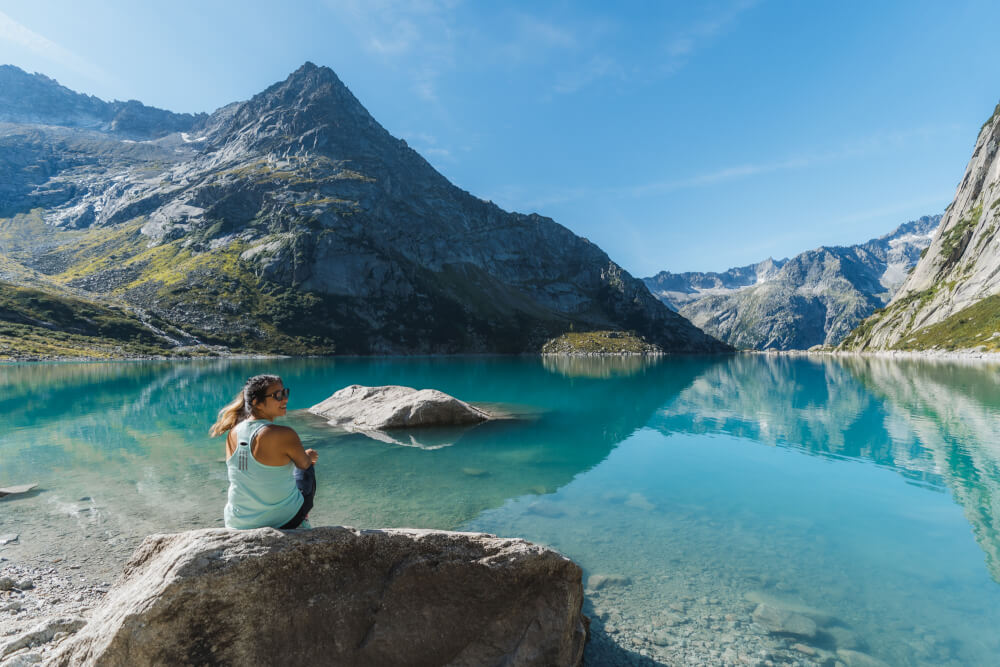
9. Go for Christmas markets!
Once upon a time, I did a whirlwind tour of Switzerland’s best Christmas markets, and it was probably that trip that sealed the country’s fate as one of my favourites.
Twinkly lights and the smell of Glühwein are usually enough (on their own) to make me tear up with joy. Add on the beauty of Swiss landscapes as the backdrop? Oof – I never stood a chance.
So, if you’re looking for one of the the most magical times to visit Switzerland, then I can highly recommend Christmas market season. If you plan your visit for earlier in the season (late November, rather than close to Christmas), you’ll usually be able to avoid the bulk of the crowds.
Here are my top must-knows for visiting Christmas markets in Europe if you want to learn more, and you can check out my Swiss Christmas market guides for more details on those:
- Zurich Christmas Market Guide
- Lausanne Christmas Market Guide
- Basel Christmas Market Guide
- Montreux Christmas Market Guide
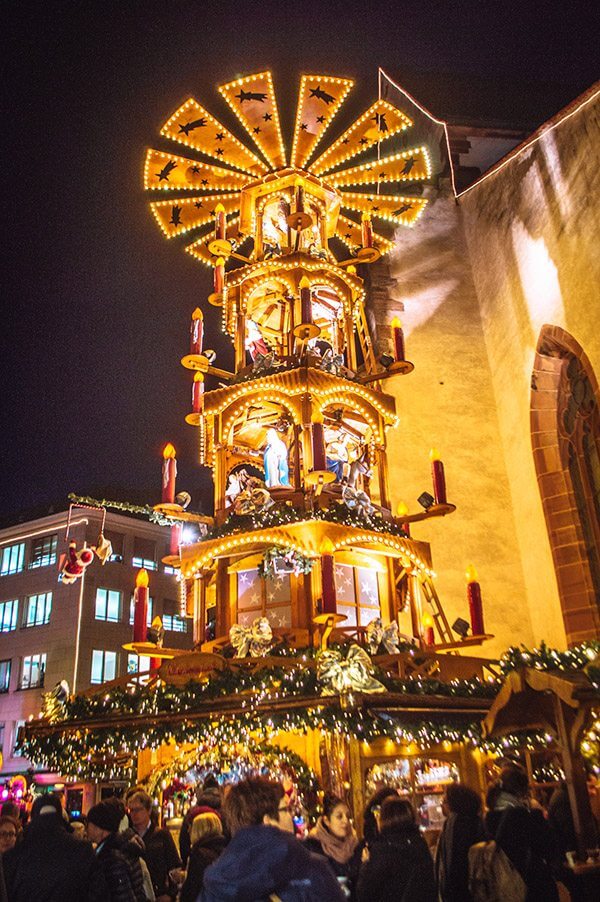
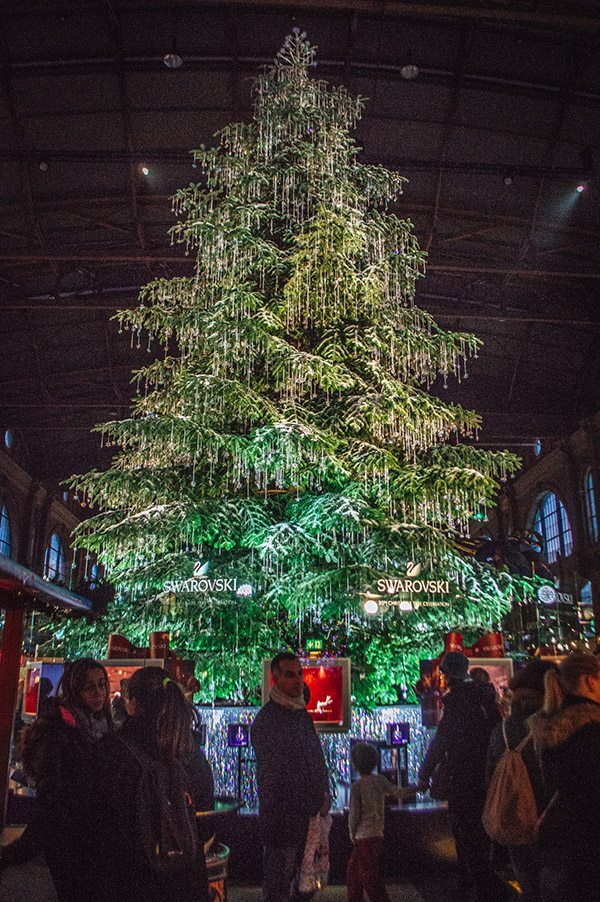
10. Use public transport as much as possible
Swiss public transport is an astounding marvel in itself. It’s so clean. So beautiful. So scenic.
(And so expensive… but hey, probably not as expensive as renting a car!)
So, if you are planning mainly city to city travel, I can advise just getting around with the public transport. In fact, most cities will offer a free Guest Card when you stay overnight, which usually gives you unlimited public transport for the duration of your stay. Not too shabby at all!
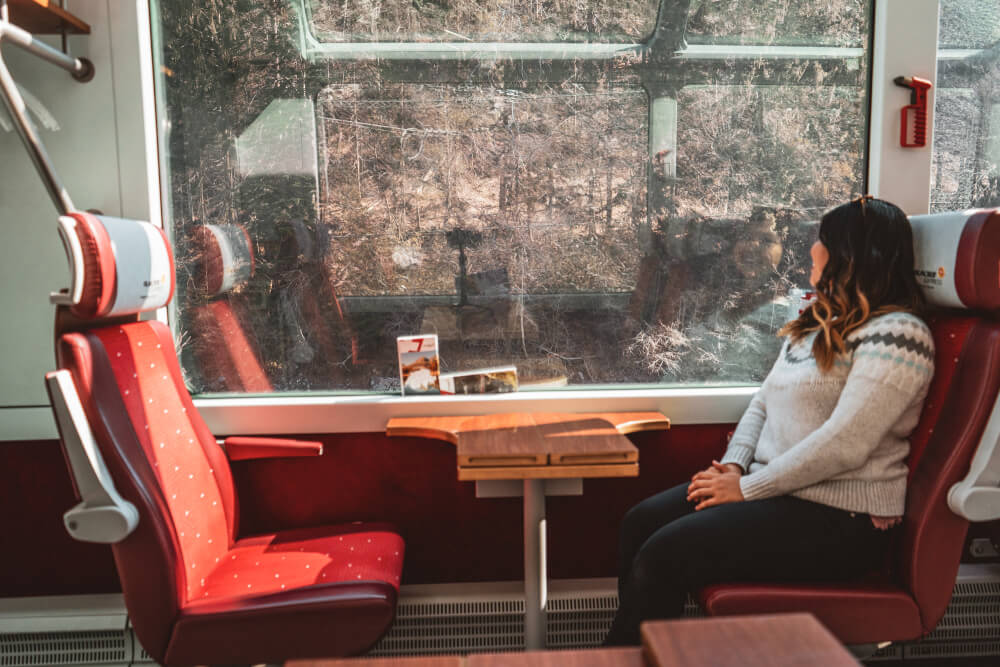
11. Look into scenic Swiss trains
And if you’re someone who likes to gaze out large windows and pretend they’re in a coming-of-age film, boy do I have the Switzerland travel tip for you.
Book yourself on one of Switzerland’s most scenic train rides... and thank me later.
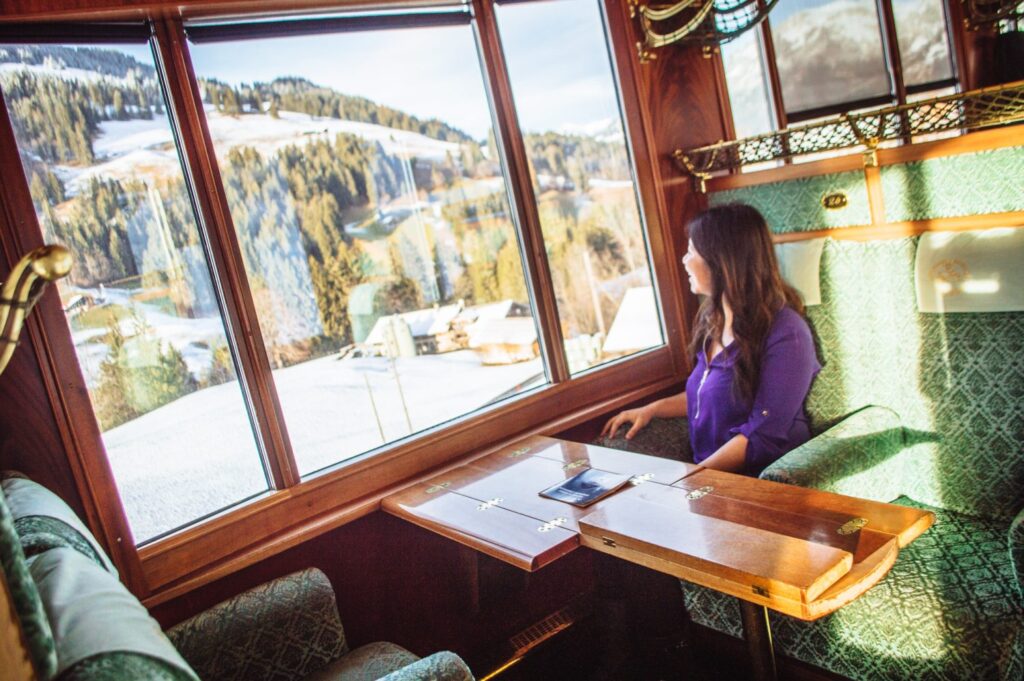
12. Book regional trains on scenic routes to save money
Now, if you do find yourself with a rabid desire to hop on Switzerland’s most scenic train routes (which duh, why wouldn’t you) then I have another secret money-saving tip.
Odds are you’ve heard of the big famous Swiss trains like the Glacier Express or Bernina Express. Both are great, but also pricey and sometimes over-congested with our fellow tourists.
But if the views are more your priority, what you can actually do is hop on a regional train that goes along the same route. This way, you get the same views at a fraction of the cost and even bonus perks like being able to roll down the (admittedly smaller) windows, or even special train cars that have space for photography!
I did this on the Bernina Express route, and actually preferred it to the main tourist/sightseeing train.
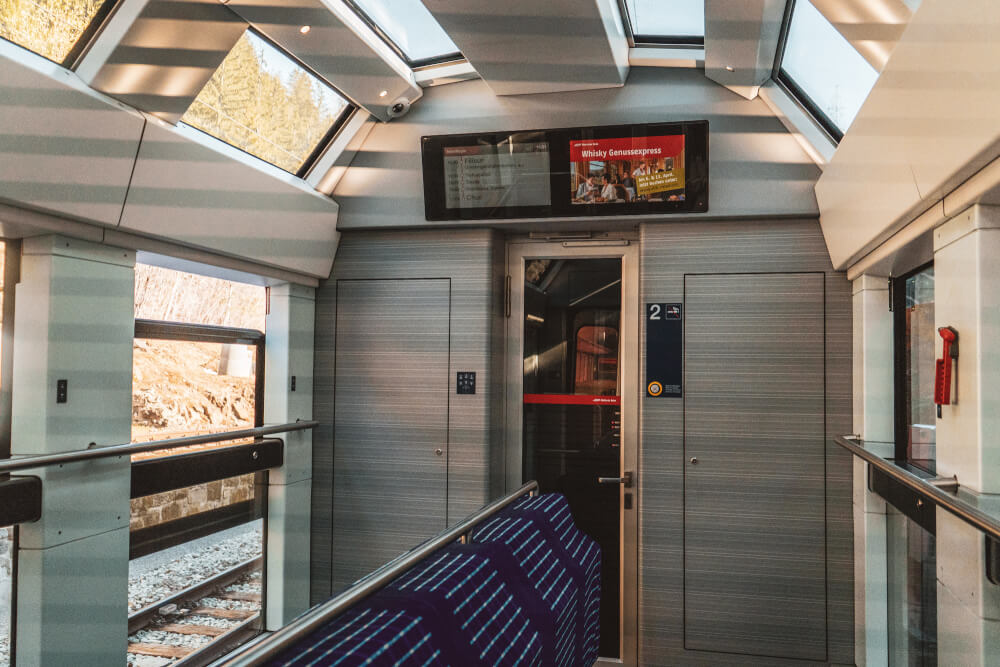
13. Look into Swiss transport passes
Even if you don’t end up using my Swiss train travel hack above, there are still many ways to save money on trains in Switzerland.
Overall, if you plan to take trains very frequently (or plan to be in the country for a while), then you’ll almost certainly save money by purchasing some kind of Swiss transport pass.
There are a few popular ones, and which is best depends on your specific situation, but here are the top options:
- Swiss Travel Pass: Gives you unlimited transport and discounts on attractions across Switzerland – prices vary depending on the time period you buy for.
- Swiss Half Fare Card | 120 CHF for a month: Gives you discounts of up to 50% on all journeys by train, bus, boat and most mountain railways in Switzerland, as well as public transport in over 90 cities.
- Regional Passes: Grants unlimited entry to attractions/public transport in a particular region, usually cheaper than buying the passes above which are nationwide. E.g. Jungfrau Travel Pass or Berner Oberland Pass
And of course, if you’re travelling to multiple countries, it might be more worthwhile to use a Eurail pass instead. This is how I managed to ride the Bernina Express and Glacier Express for a fraction of the full cost.
Read my full Eurail review for more details.
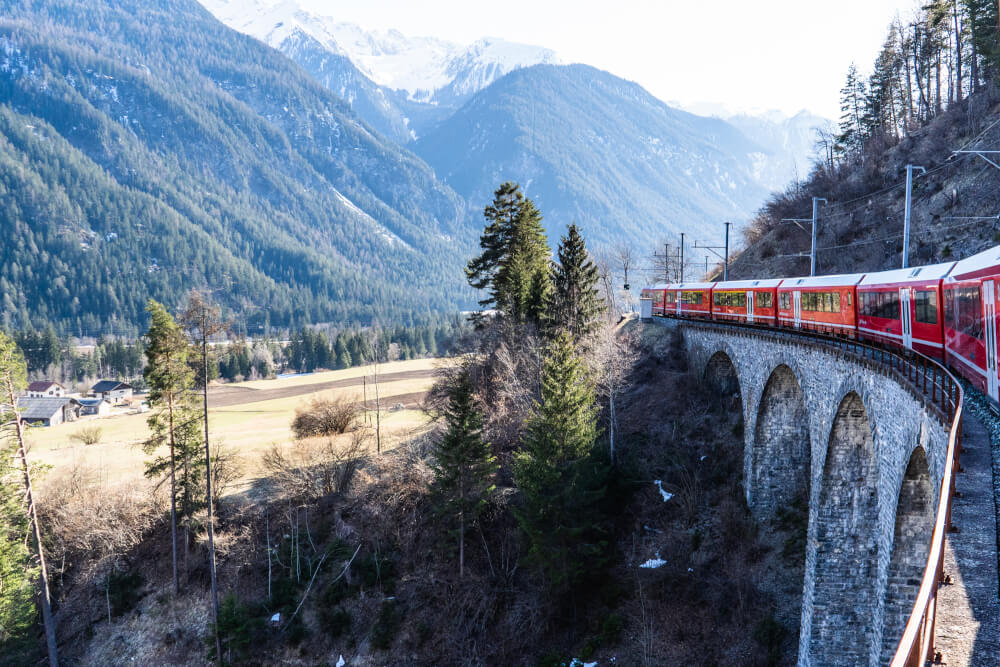
14. Rent a car if you plan to do a lot of natural sights or smaller villages
But while public transport across Switzerland is amazing, it does have its downsides.
The main one for me is that local bus services don’t tend to drop you to more remote hiking destinations or nature spots, so if your goal is go more off the beaten path, definitely rent a car.
IMPORTANT: To use the motorways in Switzerland, you need to purchase something known as a Vignette. This is a sticker you pay for that allows you to use Swiss highways. Unfortunately it’s only available as an annual sticker so it does cost 40 CHF, so that’s another cost to hear in mind.
Interested in renting a car? Here is a post to help you figure out how much renting a car in Europe really costs.
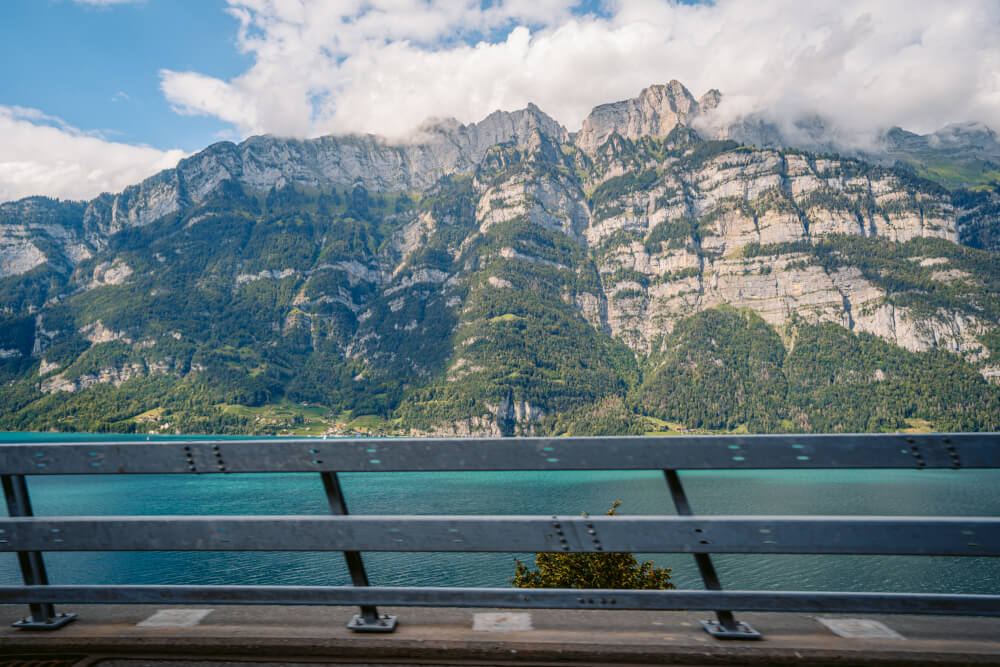
15. Learn all the tricks to saving money with your accommodation
Alright, so we’ve covered Switzerland travel tips for saving money on transport, now here are a few quick tips for saving money via your accommodation:
- Book accommodation with a kitchen to save big on food costs
- Stay in a smaller village outside a big expensive resort/city to save big
- Look for freebies/inclusions when booking accommodation (e.g. a visitor pass, meals included, etc.)
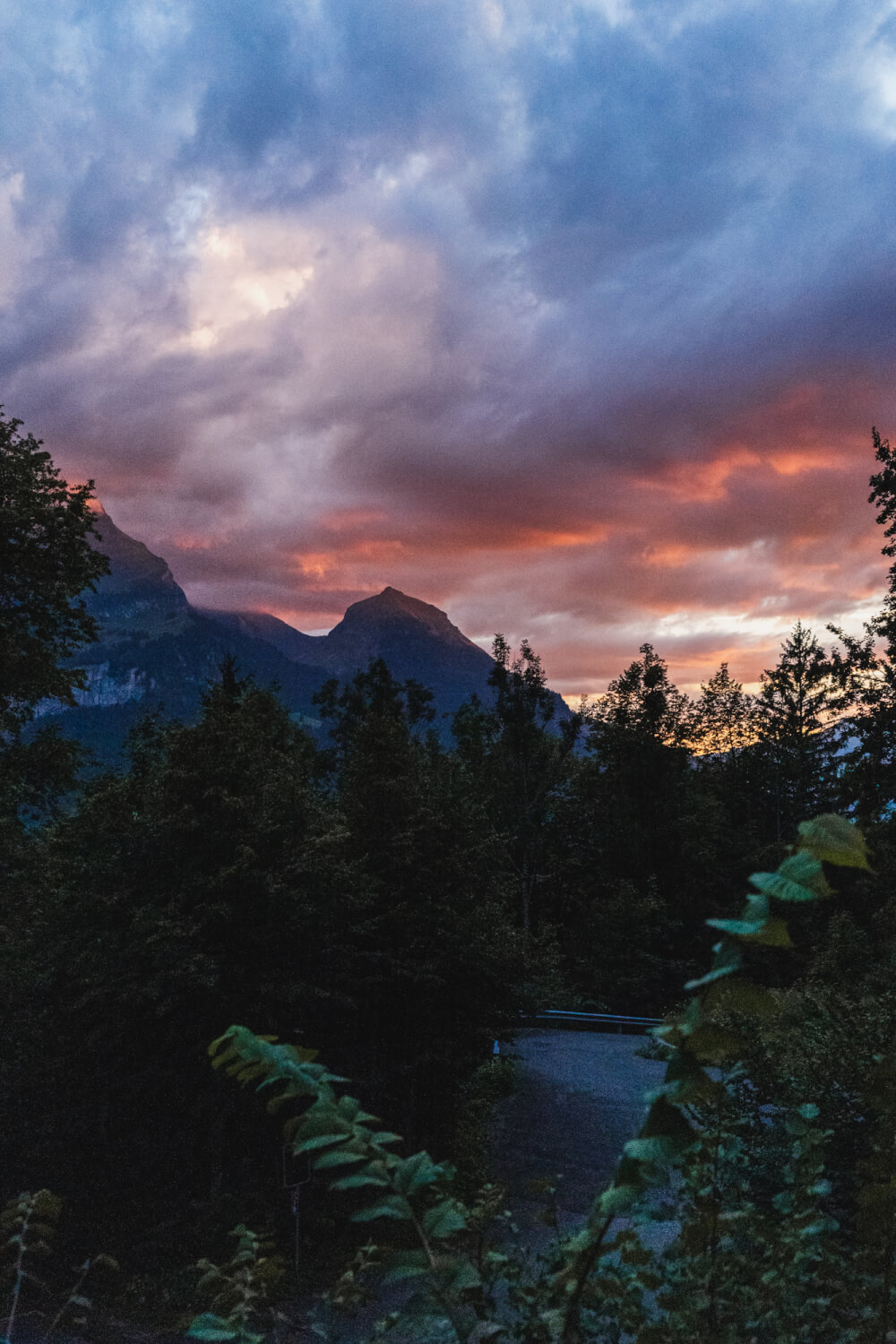
16. Budget for the tourist tax
We’ve already covered the fact that Switzerland is pricey, but an additional cost that surprises many visitors is the Swiss tourist tax.
This is an additional tax that usually has to be paid in person and can range from 2-7 francs per person per night. Yes, more money. Whee!
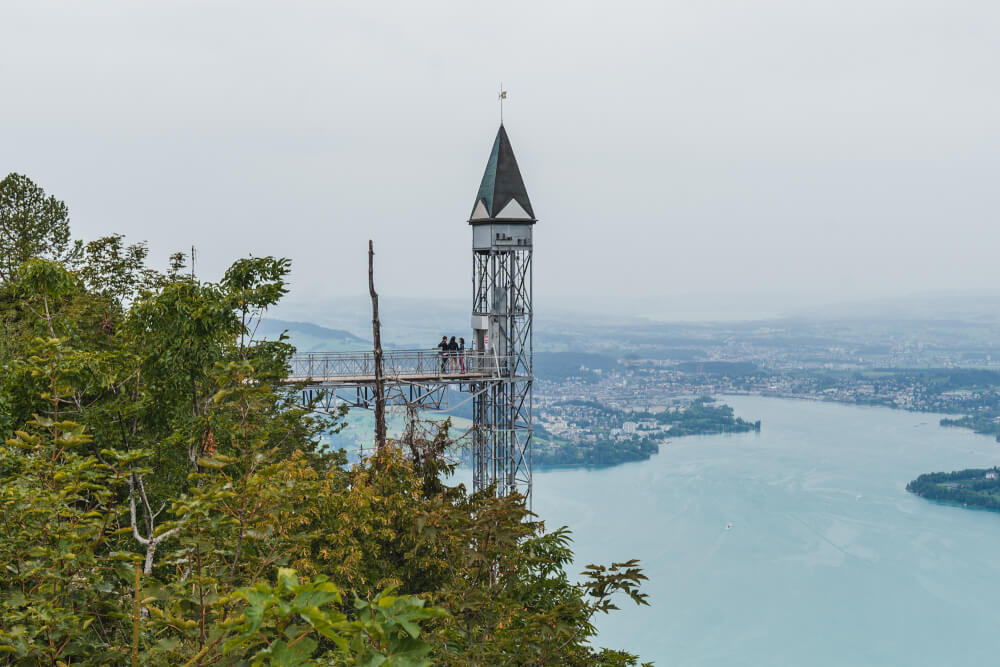
17. Don’t take Swiss directness personally
One of my most important Swiss travel tips? Don’t take any perceived ‘rudeness’ as a personal attack.
Culturally speaking, Swiss people can be very direct so don’t be surprised if you enter a bakery and they just ask “what do you want?” instead of “hey how are you? How’s your day? How’s your mom??”
They don’t tend to do the whole ‘overly friendly customer service’ thing here, so just accept it as a cultural difference, and know it’s not worth ruining your trip over.
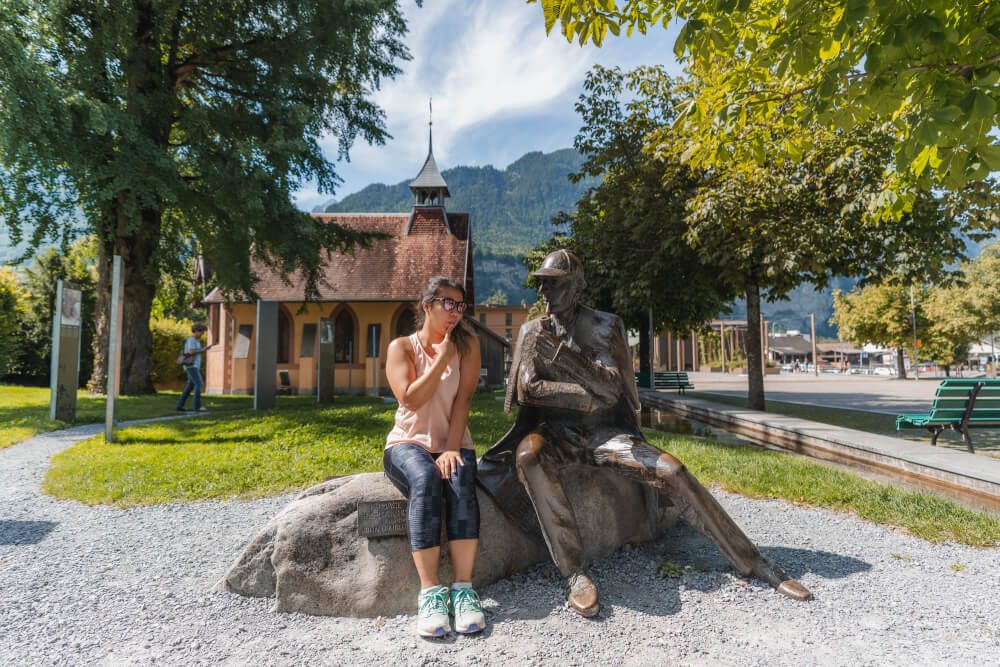
18. Prepare for an earlier start to the day
Another potential Swiss culture shock? Generally speaking, Swiss people get up early.
As a result, shops open earlier, and close earlier too. It’s not uncommon for grocery stores to close at 6:30 or 7pm, so keep that in mind when preparing your day.
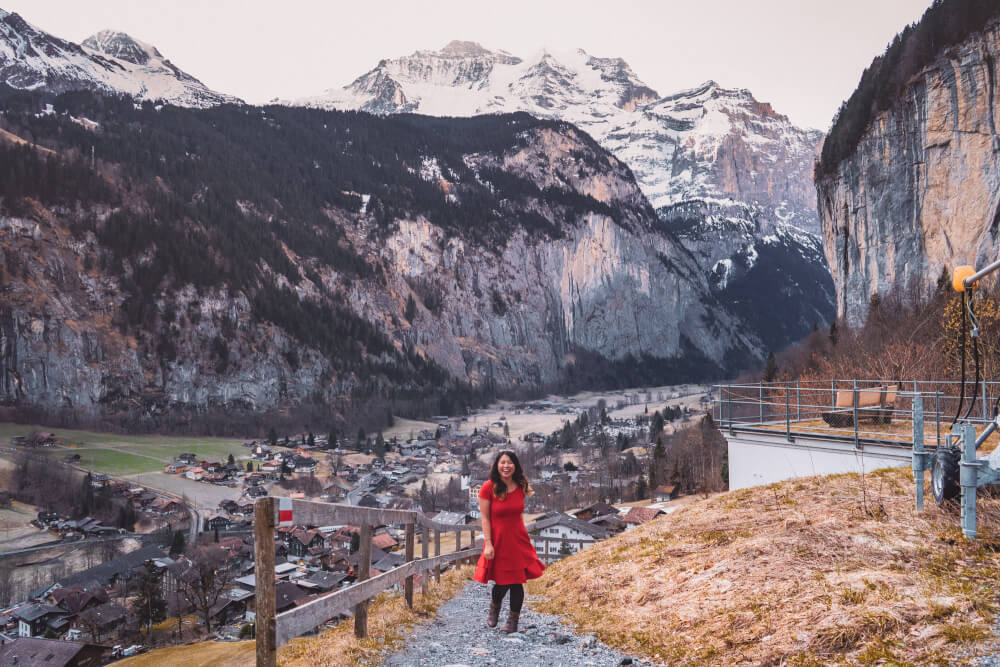
19. Learn how to tip in Switzerland
Tipping is definitely not expected in Switzerland to the same extent as in North America. Often rounding up is considered enough (e.g. if your bill is 45 euro, then rounding up to 50), with 10% being a rough benchmark for good service.
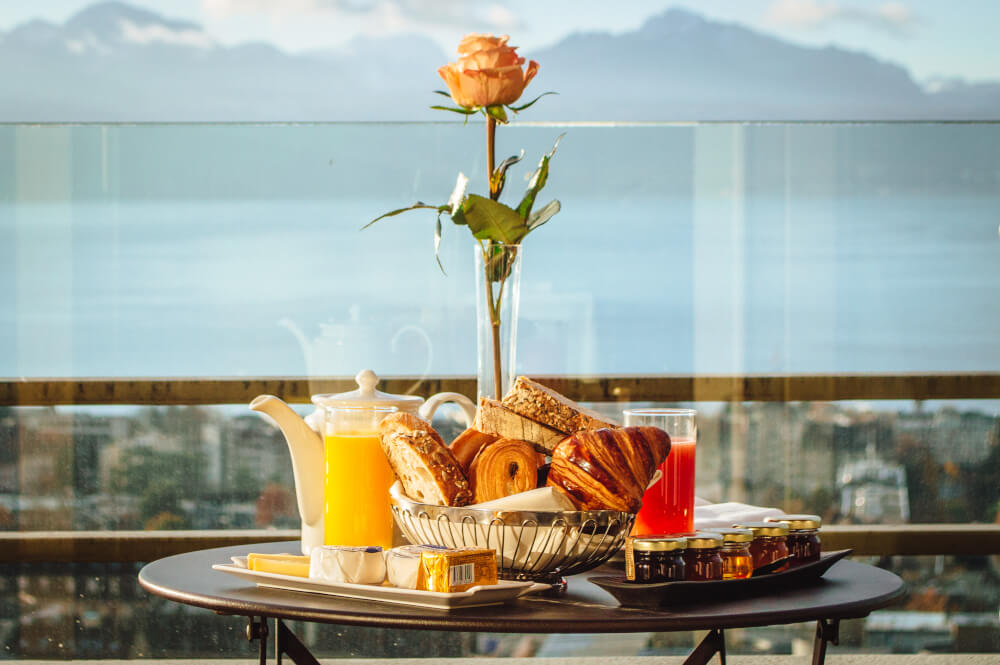
20. Thoroughly research your hiking route beforehand
Alright, now this is a more specific Switzerland travel tip, but if you plan to do any hiking while you’re there, listen up.
Research beforehand is very very important.
Swiss locals tend to be highly athletic and begin hiking from a young age. In fact, I’m convinced most Swiss people exit the womb with hiking boots on.
As such, I’ve noticed hiking resources like signs in Switzerland aren’t super helpful for beginners, so make sure you thoroughly research the trail and make sure you can do it before committing. Swiss mountains are no joke.
One of the most infuriating parts of travelling in Switzerland is the ubiquitous “Wanderweg” (Hiking Path) sign, which often points in two directions and offers little to no help for those new to these trails… so here’s an example of what you might be working with:
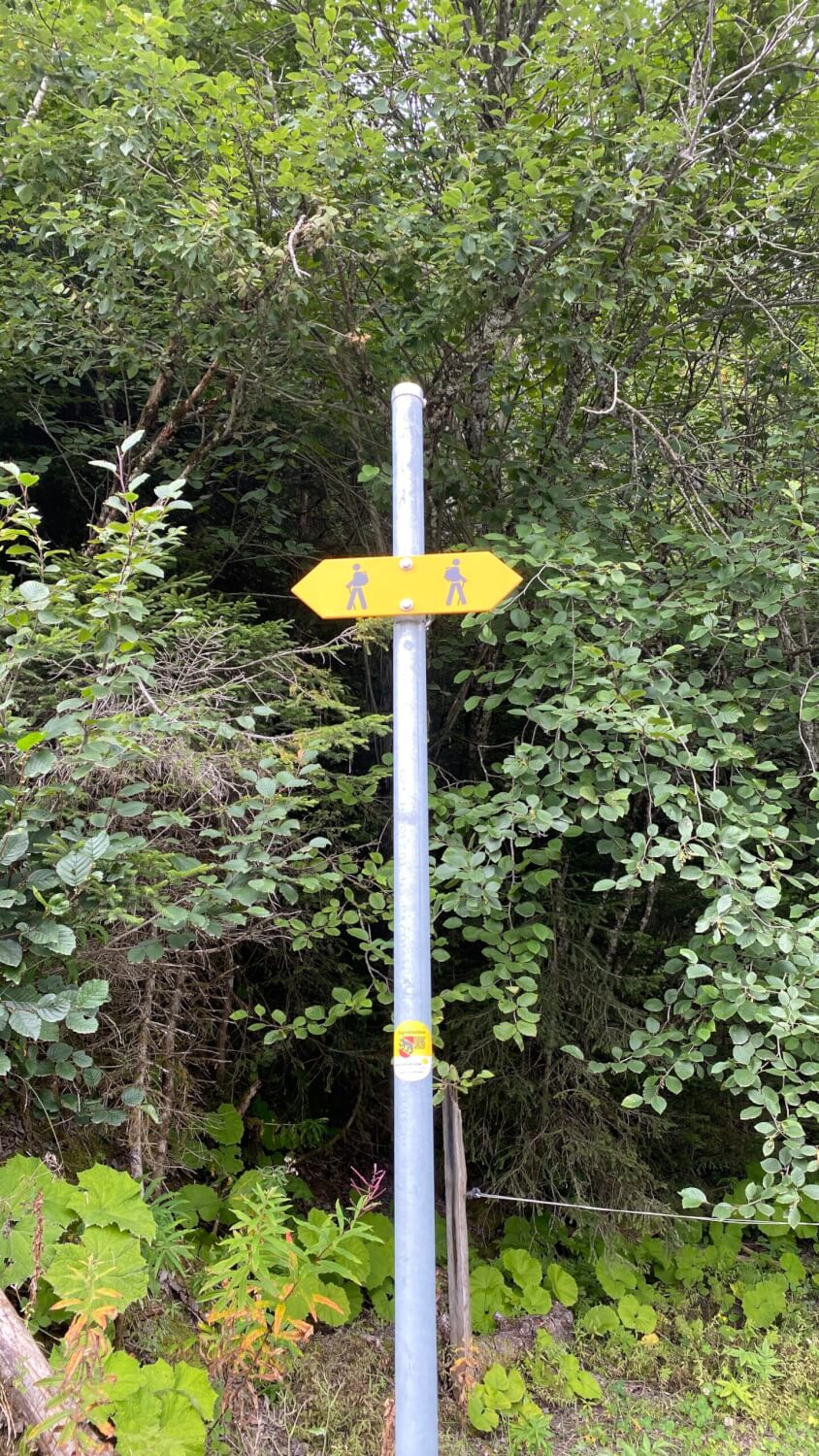
21. Consider an SAC membership
If you plan on doing a lot of hiking and intend to stay at mountain huts, another Swiss money-saving tip is getting a membership for the Swiss Alpine Club (SAC).
This membership costs between 80 – 110 CHF a year but comes with a ton of perks like 50% off mountain hut stays.
Considering how expensive accommodation is, this can definitely be worth it for a longer hiking heavy trip.
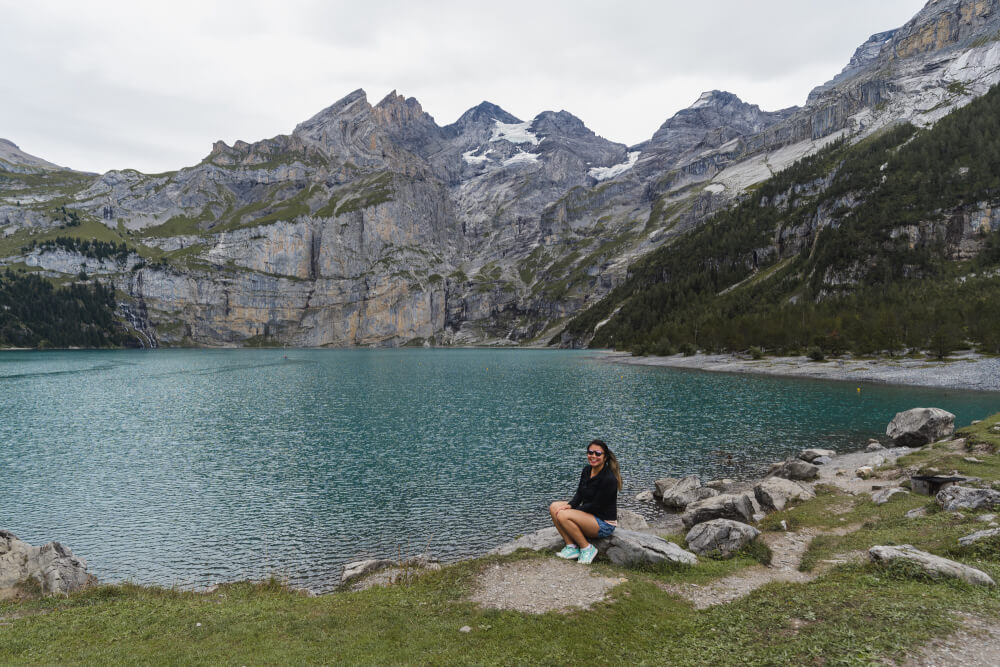
22. Splurge on some Swiss specialties
Alright, now let’s engage in a swift pivot from Swiss hiking to Swiss FOOD.
Yes, welcome to your happy-place.
Food-wise in Switzerland, I’ll be sharing some budget friendly tips below, but I do think it’s important that you don’t miss out on Swiss food while you’re over there. I know it can be pricey, but frankly there are some Swiss specialties that are worth the splurge.
Some Swiss must-tries include:
- Fondue: A delicious pot of melted cheese or chocolate that you dip things in
- Raclette: An amazing cheese that you melt a layer of and scrape over top potatoes and veggies
- Rösti: a crispy potato pancake
- Chocolate: A treat that requires zero introduction
NOTE: Apparently it’s considered sacrilegious to drink a cold beverage other than white wine while eating fondue or raclette. It stems from an old belief that this will lead the cheese to glop up weirdly in your body and kill you, but that has been scientifically dismissed. Instead, you’ll just be getting some weird stares from locals if you do… like we did when this photo was taken:
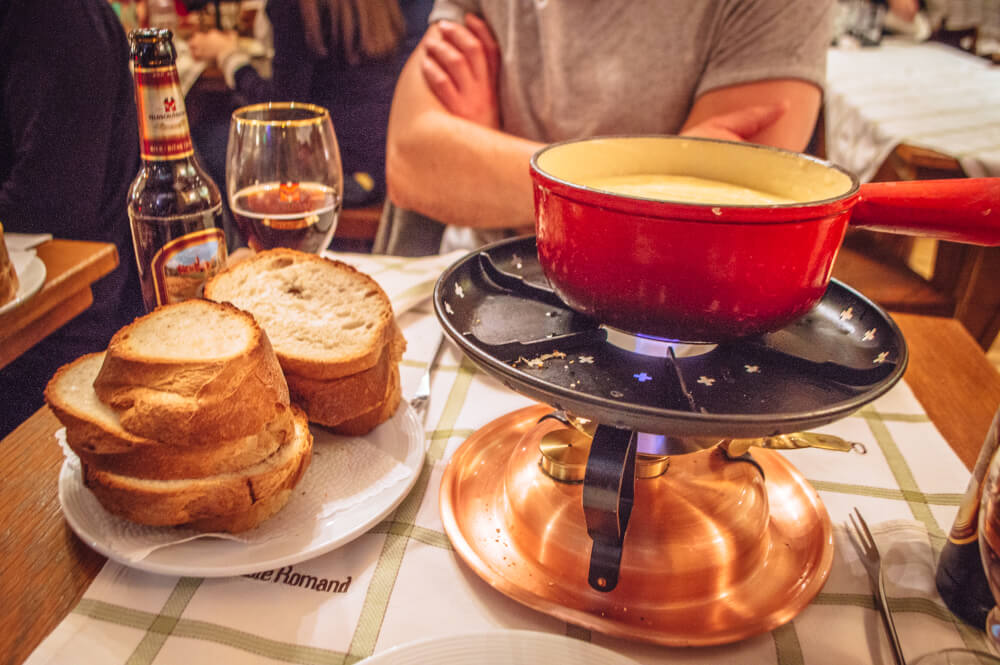
23. Have a quick search of regional specialties before you go
While yes, fondue and raclette are great, you should make sure to try some other lesser known Swiss delicacies too.
The cuisine in Switzerland can vary a lot depending on where you go, so I’d recommend doing some research beforehand about what the best must-tries are, so you can keep an eye out for them.
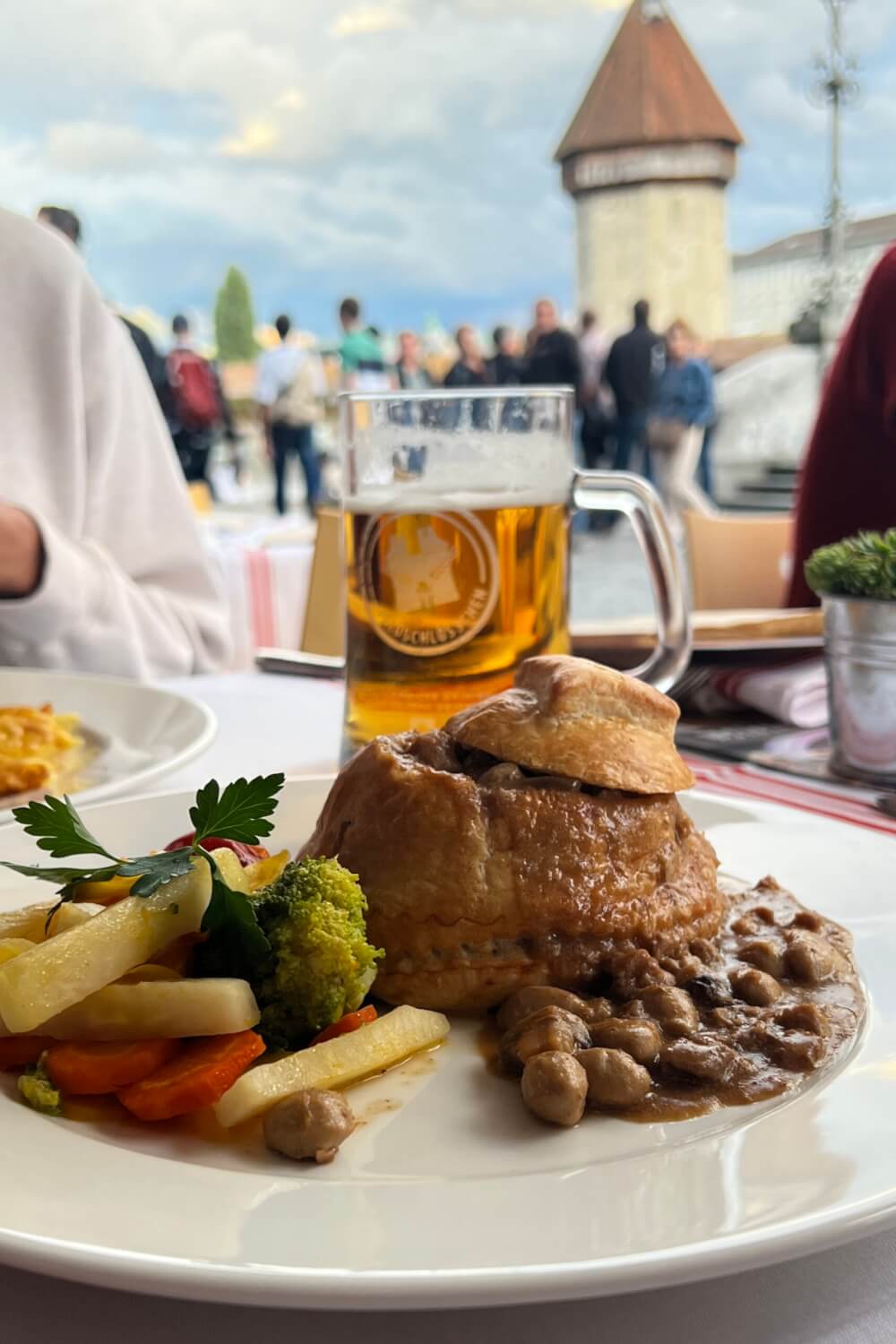
24. Stock up on supplies before visiting Switzerland
Alright, now for the less fun budget-friendly version of my Switzerland advice.
It’s a lot less exciting, but nonetheless necessary. Unless you want to leave Switzerland bankrupt.
First off – one of the best ways to keep your budget down is to ensure you grab all your necessities before you get to Switzerland.
The last thing you want to do is realize you forgot shampoo, or a razor, or your favourite granola bars, then be at the mercy of Swiss prices for all these random items.
So, stock up before you leave and your budget will thank you.
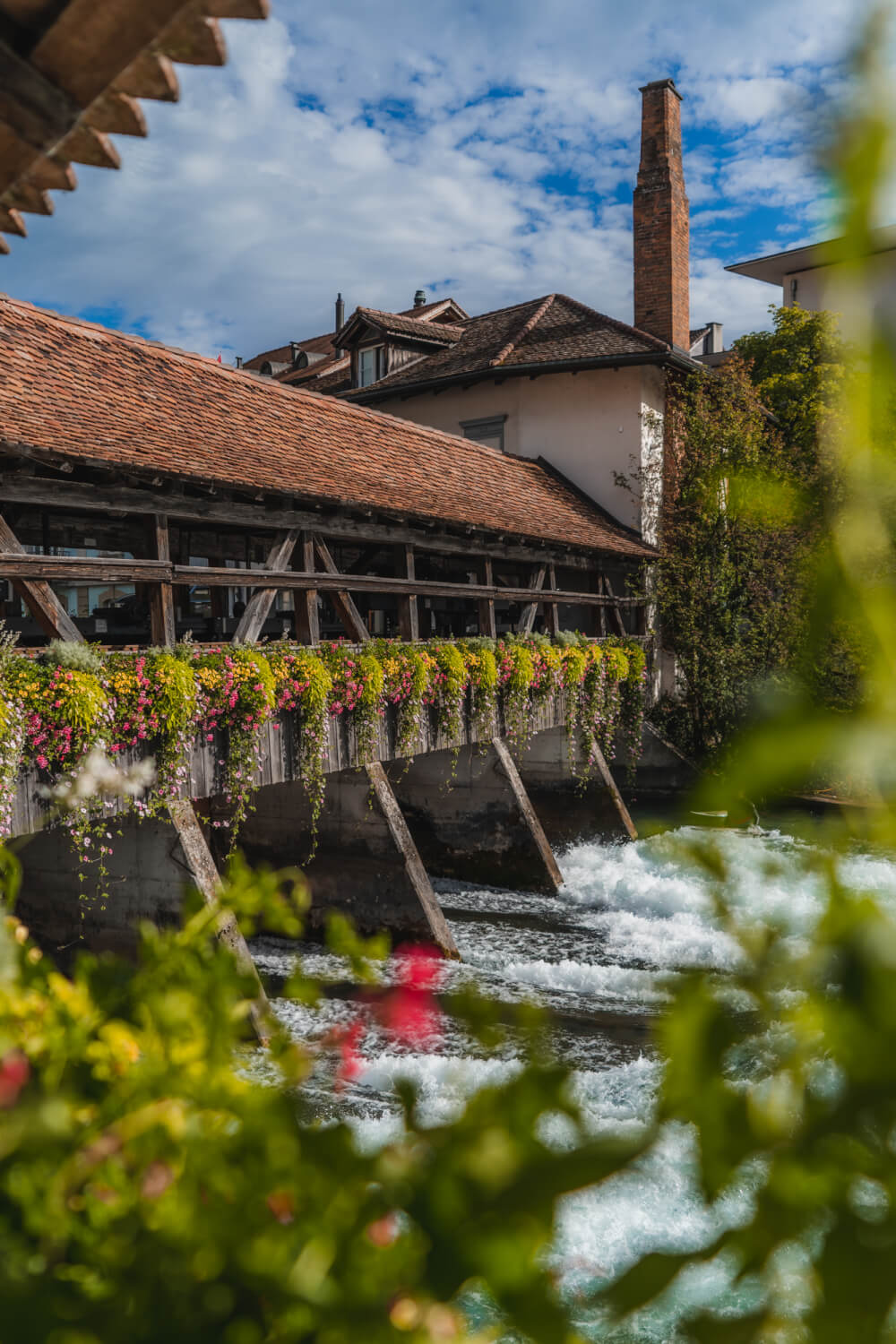
25. Buy groceries & cook to save big
On a similar note, if you’re on a budget, don’t feel pressured to dine at a restaurant for every meal while in Switzerland.
These costs can add up quickly, and since service in Europe is less rushed than in North America, often this will cut into your sightseeing time as well.
Instead, don’t forget that grocery stores and markets are a great resource for cheap grab & go meals, or even groceries for whipping up your own meals if you’ve booked accommodation with kitchen facilities.
The cheapest places to get groceries in Switzerland would be ALDI or Lidl (huge German chains known for their rock bottom pricing), or Switzerland’s own leading discounter, Denner.
Depending on where you are though, I’ve found that there often aren’t one of these available, so in those cases, be sure to look for the budget store brand for whichever supermarket you’re shopping at. These would be…
- M-Budget brand at Migros
- Prix Garantie brand at Coop
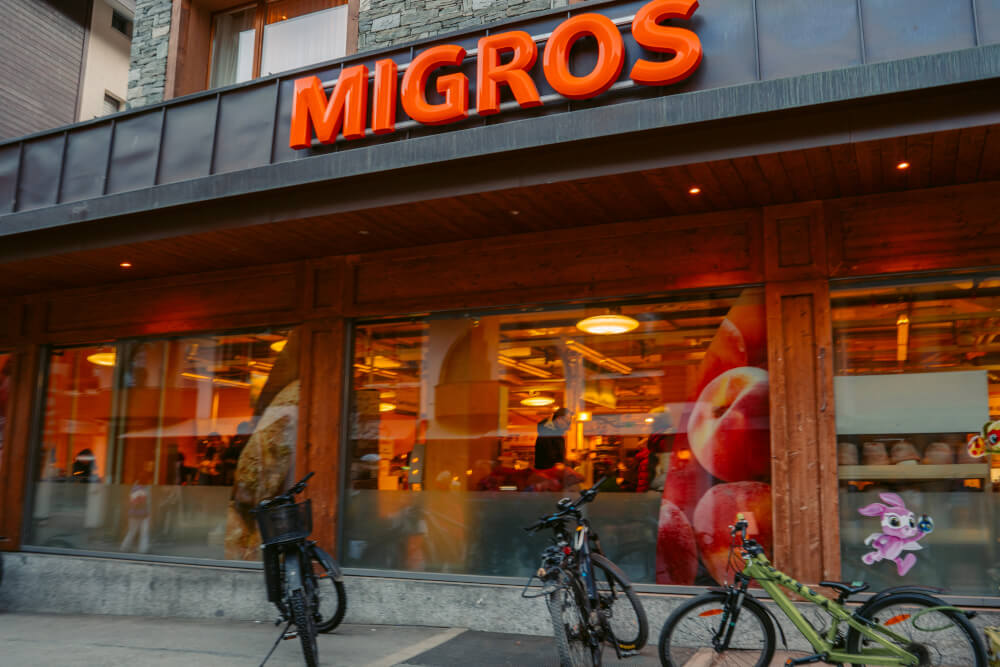
26. Shop for souvenirs at the supermarket
If you’re looking for nice goodies to bring back home to loved ones, often you’ll save a lot of money by buying them at the supermarket, rather than at pricey souvenir shops.
And no, I don’t mean in a “hey Timmy, I missed you, here’s some Swiss lettuce” kind of way, but moreso in a “suitcase full of Swiss chocolates and personalized Toblerones” kind of way.
Many souvenir shops will sell chocolate and the like, but usually for a higher markup than supermarkets. Beyond that, many supermarkets in more touristy areas will also have things like postcards and magnets too, so keep an eye out! Nobody from home has to know.
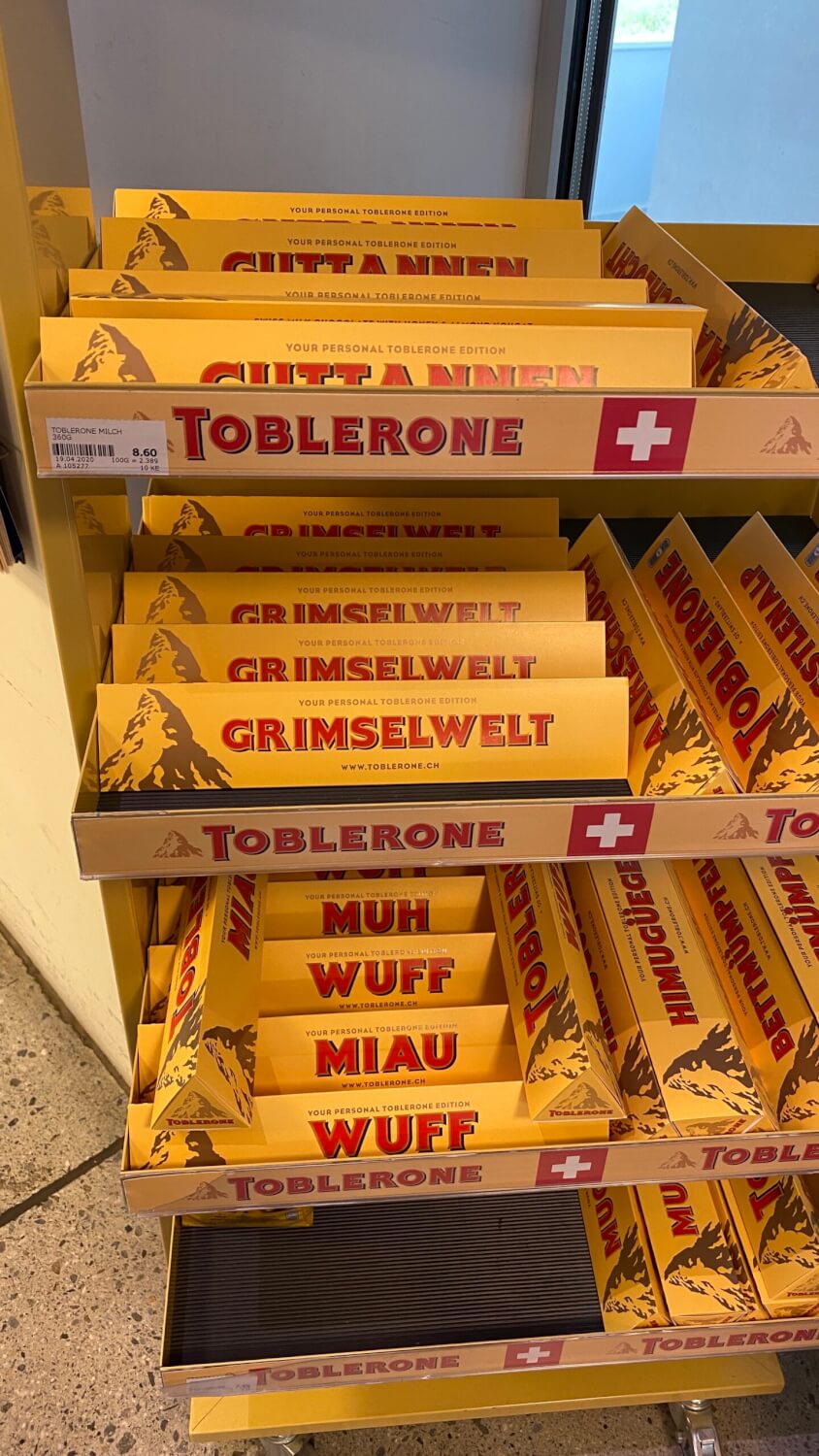
27. Visit Äss Bar
Yay! My favourite Switzerland tip for saving money! Because I’m sure you’re all absolutely mortified right now from that heading.
Don’t worry though – I haven’t completely lost it. I know the name seems a bit… questionable, but Äss Bar is actually a unique Swiss chain known for their low prices because they sell day old food that’s still good to consume.
It’s all bakery stuff like sandwiches, salads, and pastries, and honestly really good value for money, with quite a few locations now spread across the country. I’ve enjoyed a salad from there before, and was very pleasantly surprised by the price and quality.
Overall – it’s a great pick if you’re on a budget, or at the very least a fun photo opp:
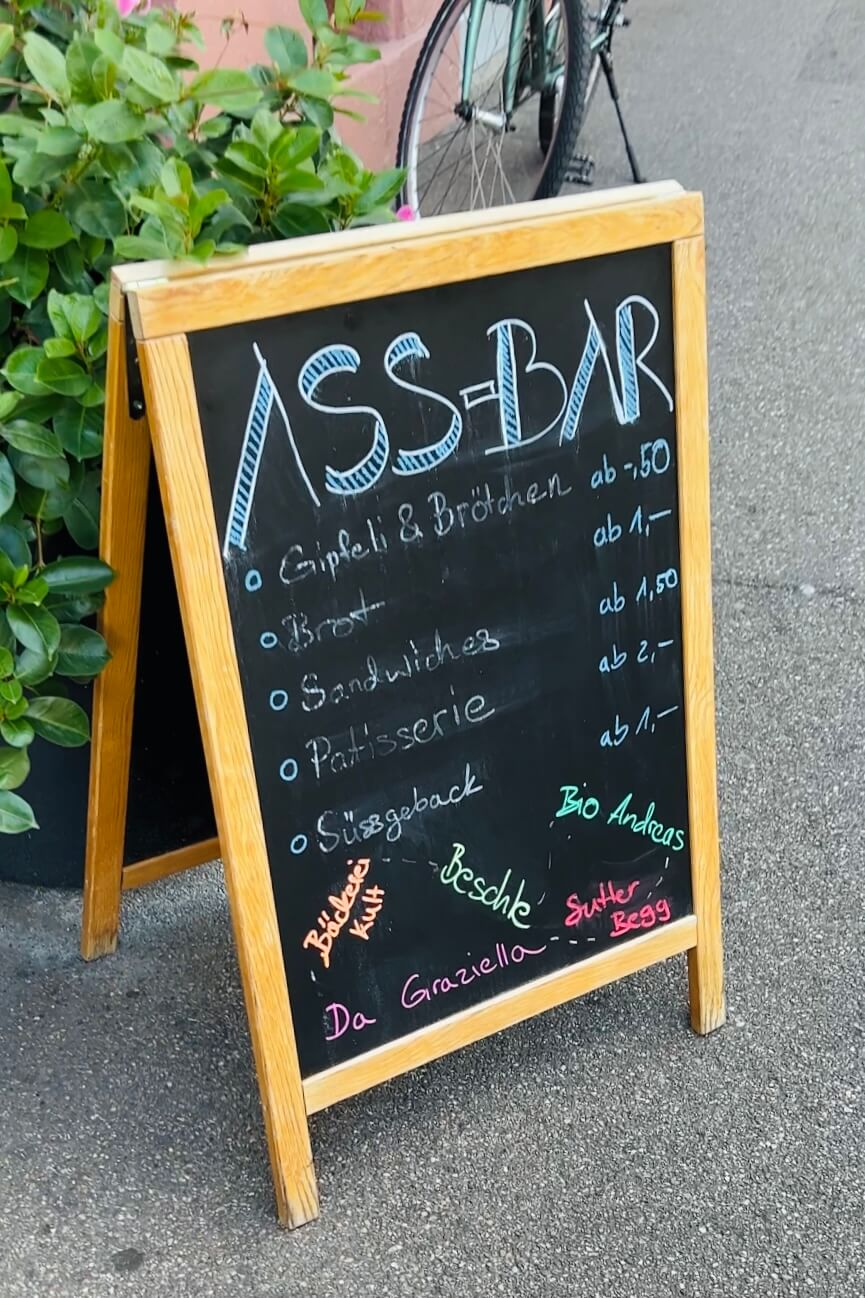

28. Consider sightseeing/attractions passes
If you plan to do a lot of paid attractions while in Switzerland, those costs can add up, so another way to save money on those is by purchasing… you guessed it – a pass!!
Most cities and regions will offer an attraction pass of some kind that bundles up entry to multiple attractions and modes of transport for one set price. If you plan to do a lot of paid sights, these can save you a ton of cash.
I’ve previously purchased one in Lucerne and was shocked by how much I saved.
Buuuut beware that some attractions and cable cars are privately owned and won’t be part of certain passes, so definitely read the fine print to double check if there’s a specific sight you had your hopes on.
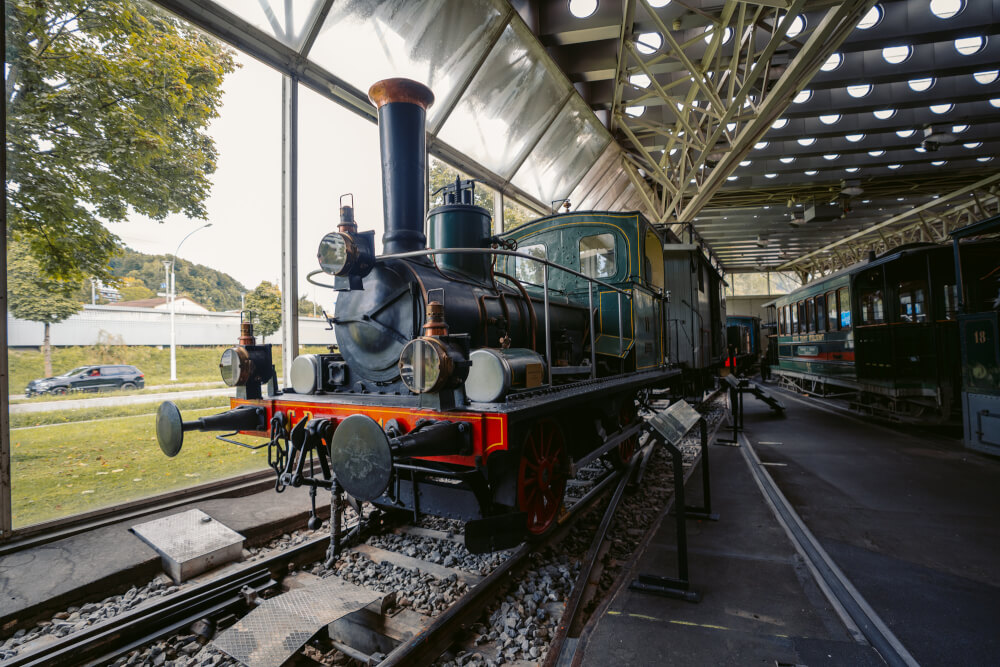
29. Prepare for ever-changing weather
Generally, I have been blessed with beautiful weather on every trip of mine to Switzerland, but I’ve learned the hard way that Swiss weather conditions can change quickly. Very quickly.
It can also vary a lot depending on your elevation.
Many first time visitors fail to take into account that nasty weather conditions can mean zero visibility up in the mountains, which is a bummer when you pay so much to get up there!
So, be sure to check weather reports diligently and don’t forget what a huge consideration that is during your Switzerland trip… and pack layers so that you’re not caught off guard with swift changes in temperature and conditions.
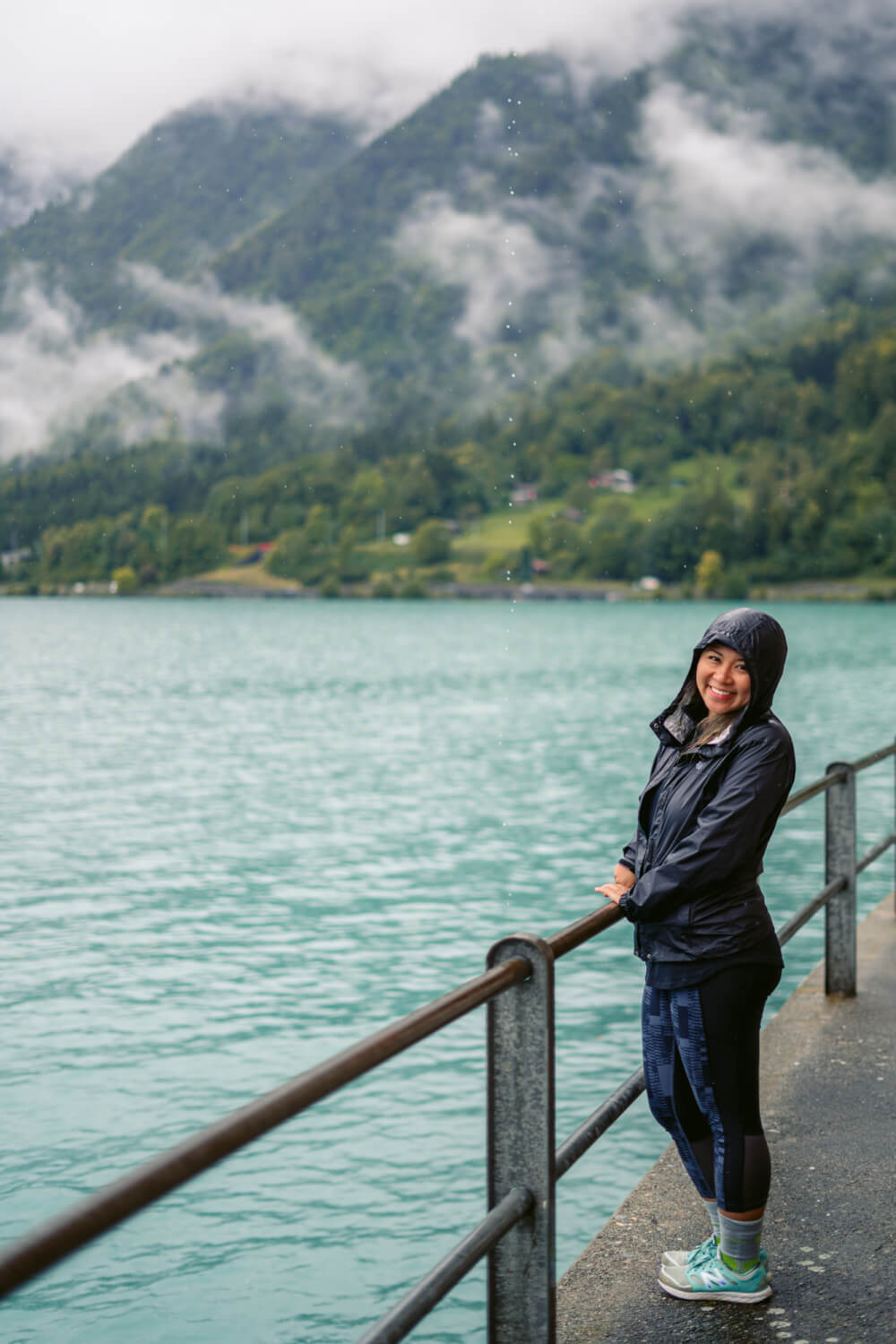
30. Use webcams to spy on visibility conditions for mountain attractions
Another important tip is to use webcams to check visibility conditions before heading up to alpine attractions.
Swiss mountains are epic… but they’re also very high up. And just because the visibility is fine on ground level doesn’t mean it will be 2000m above ground.
This is why I’d advise against booking set date tickets or tours for Swiss alpine attractions until you get close to the date and have an idea of the forecast. It can be very disappointing to spend a bunch of money just to get up and see nothing but pure whiteness.
Anyways, one way to quickly check on weather is by using webcams. Most mountains will have a few installed so just google the viewpoint name and webcam to see if you can find one.
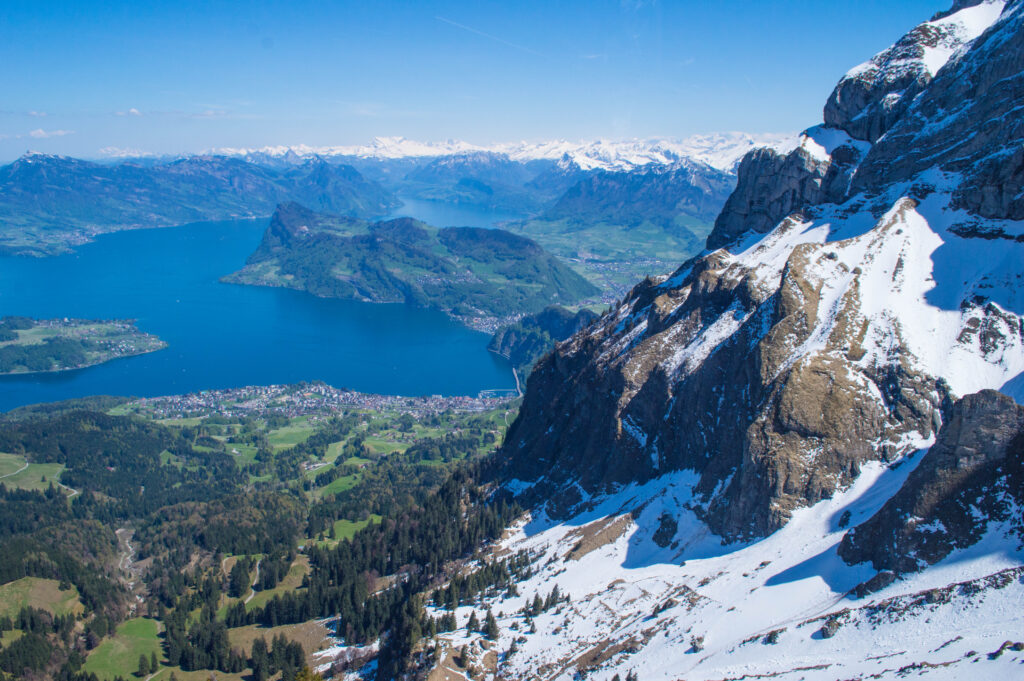
31. Rent free bikes
And as if Switzerland didn’t sound Utopian enough, another hot Swiss travel tip for you is that some cities actually offer free bike rentals so long as you put down a deposit and ID.
Here are two known cities that do this:
- Zurich: ‘Züri rollt’ program – free bike rental with a deposit of 20 CHF
- Geneva: GenèveRoule program – free bike rental in the summer with a deposit of 20 – 100 CHF plus an ID
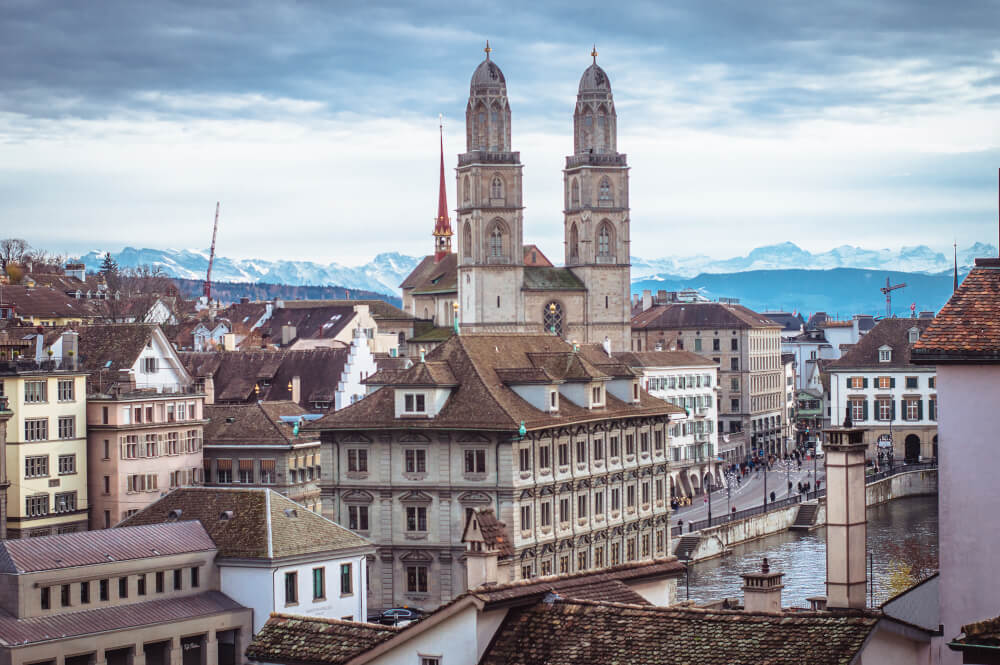
32. Use train station lockers
When travelling around Switzerland, if you’re looking for a stress-free way to explore a city for the day, or if you need a place to dump your bags before check-in or after check-out, remember that most Swiss train stations have a paid locker service that will totally save your life.
With them, you can explore with ease without worrying about lugging your bags around. So helpful!
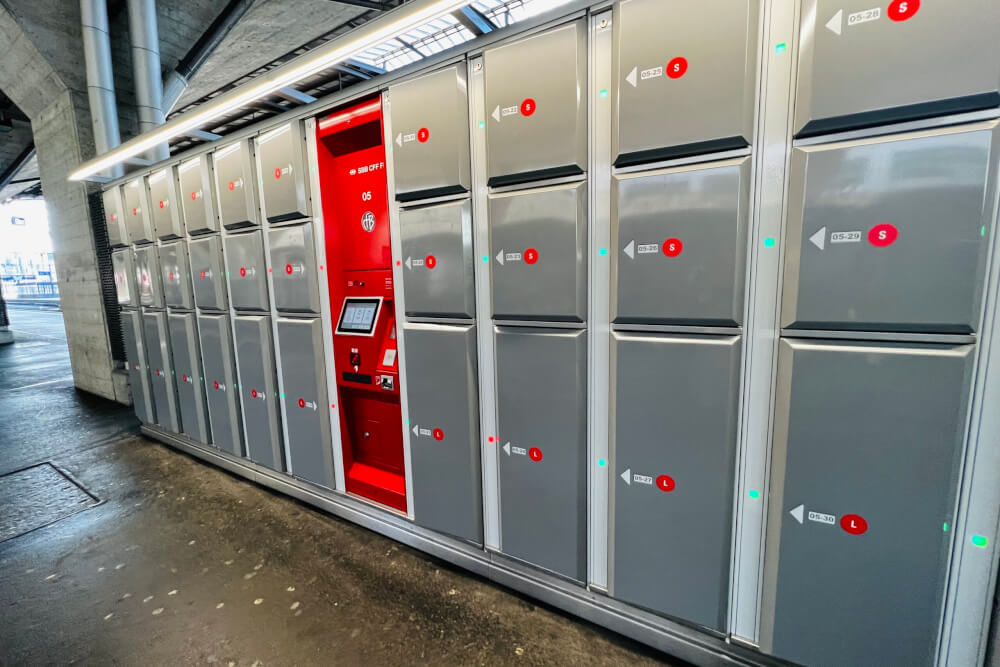
33. Get familiar with the many free things to do in Switzerland
Alright, as we near the end of this list of Swiss travel must-knows, it’s worth mentioning that while the country is (generally) quite expensive to travel, many of the best things to do in Switzerland are free.
Hiking? Free. Swimming in lakes? Free. Leaving a trail of drool as you gape at all the landscapes? Very messy… and very free!
Beyond the obvious however, there are many free attractions in pretty much every major Swiss city, from museums and parks to even a free tour of the Swiss Parliament Building.
So, be sure to google “Free Things to Do + Destination” to uncover a wealth of great freebies.

34. Know what “CH” means
Last but not least, allow me to solve a Switzerland mystery for you so you can strut around during your trip as someone ‘in the know’.
All over Switzerland, you’ll see the letters “CH” everywhere – the currency is CHF, most Swiss website URLS end in .ch…. etc. etc.
So what is that about? Well, as I learned, it comes from the Latin “Confoederatio Helvetica”, AKA the “Helvetic Confederation”.
The Helvetians were a Celtic tribe that occupied Switzerland for hundreds of years up to the 5th century.
Their legacy lived on through the Latin name of Switzerland through the Middle Ages (Helvetia), which is still seen today all over the country in the form of “CH”. Just in case you were curious (and want to flaunt your knowledge in front of your travel companions).
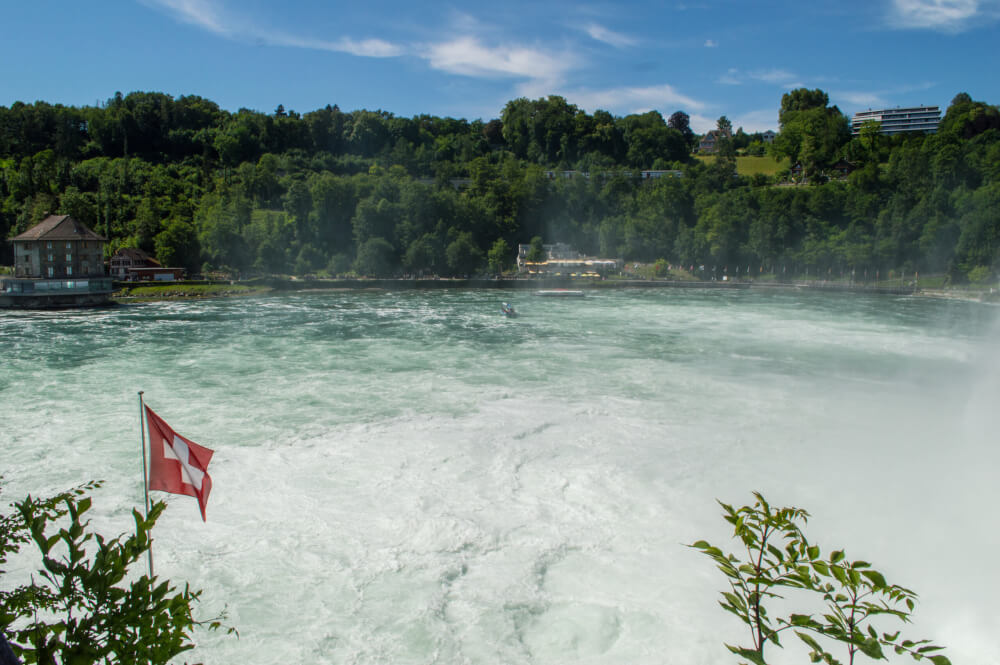
I hope this list of Switzerland travel tips was helpful!
Made it this far? Still reading? Wow! Hi mom 🙂 I admit this was a VERY long list of tips for Switzerland travel, but if you have any more questions, let me know in the comments.

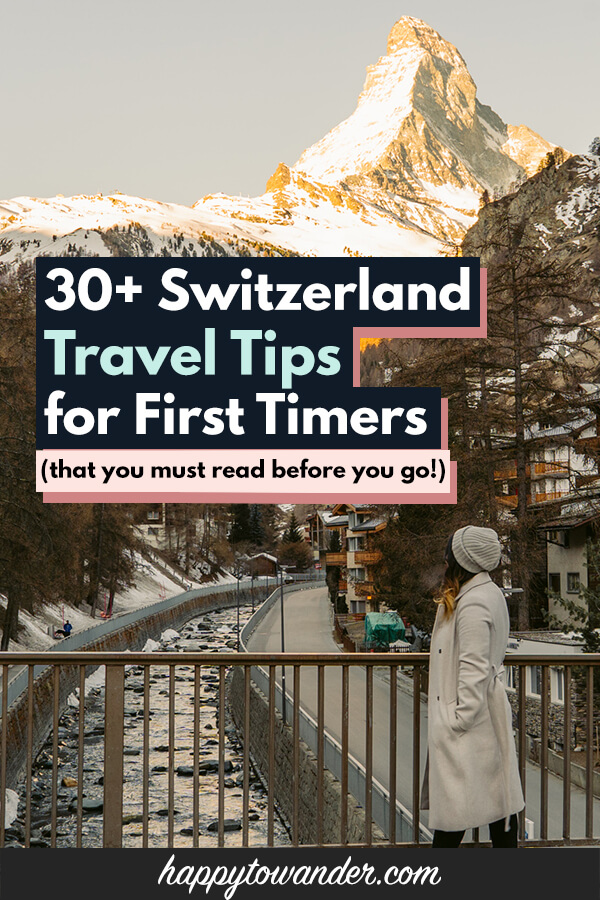
I’ve lived here for ten years and still always giggle when I see the Äss Bar.
“The main one for me is that local bus services don’t tend to drop you to more remote hiking destinations or nature spots”
Yes they do. There are endless bus and train stops in the middle of nowhere. Certainly there are some spots you can drive to that would be an hours walk or more from the nearest public transport stop, but it would take years to exhaust all the options that are possible without a car.
“One of the most infuriating parts of travelling in Switzerland is the ubiquitous “Wanderweg” (Hiking Path) sign, which often points in two directions and offers little to no help for those new to these trails”
Those signs are just to indicate which of multiple options the path follows. If you come across a sign like that it means you just somehow stumbled into the middle of the section.
There are frequent signposts at every junction on the network and likely starting place (village, bus stop, car park etc) showing the destinations with the average time to reach them, and useful things like food or transport options – often with a map too in villages/transport stops.
You can also download the map on the SwissTopo app for free and check your position on that if you do somehow start mid-route.
Hi,
Great article, and a ton of useful info !!!
I’m going there for Christmas & New Years by myself for the first trip across the pond. Flying in and out of Zurich. Starting off in Bern for Christmas, and eventually making my way back to Zurich. Any suggestions for Christmas day in Bern or New Years in Zurich….or elsewhere ?
Thanks again for your awesome article !!!
Hi Craig, sounds like you have a great trip planned! I haven’t spent Christmas in Bern so I’ll point you towards their official tourism page which will have more helpful info: https://www.bern.com/en/christmas/highlights If you didn’t know though, do prepare yourself for the fact that most (if not all) of the Christmas markets will be closed on Christmas Day.
As for New Years in Zurich, again, I haven’t had that experience myself but it looks like they do a cool fireworks display over the lake! Here’s more info on that: https://www.zuerich.com/en/visit/new-years-eve-in-zurich
Hope that helps, and safe travels! 🙂